外研版必修3 Module 5 Great People and Great Inventions of Ancient China Cultural Corner课件(26张ppt)
文档属性
| 名称 | 外研版必修3 Module 5 Great People and Great Inventions of Ancient China Cultural Corner课件(26张ppt) | 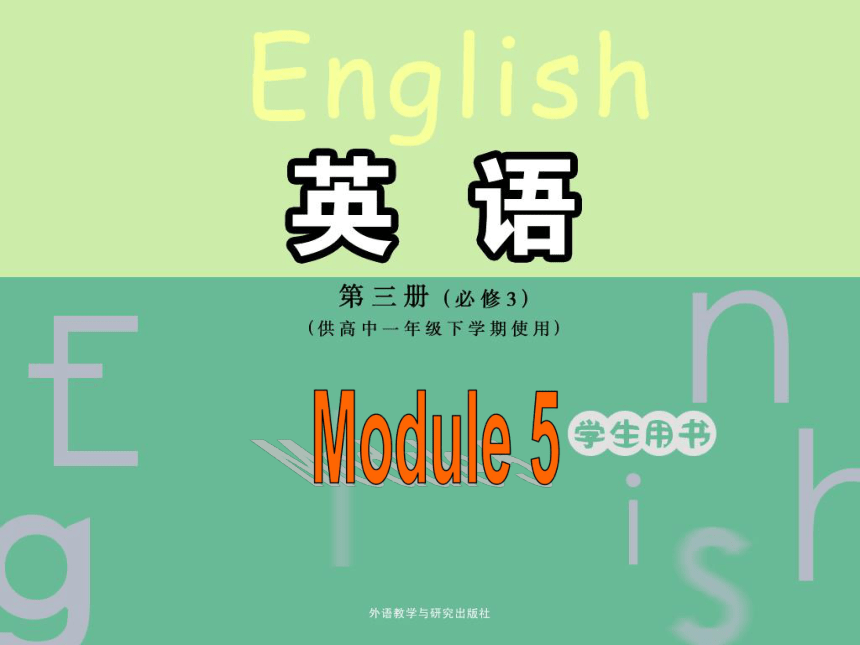 | |
| 格式 | zip | ||
| 文件大小 | 2.5MB | ||
| 资源类型 | 教案 | ||
| 版本资源 | 外研版 | ||
| 科目 | 英语 | ||
| 更新时间 | 2022-01-28 13:10:49 | ||
图片预览

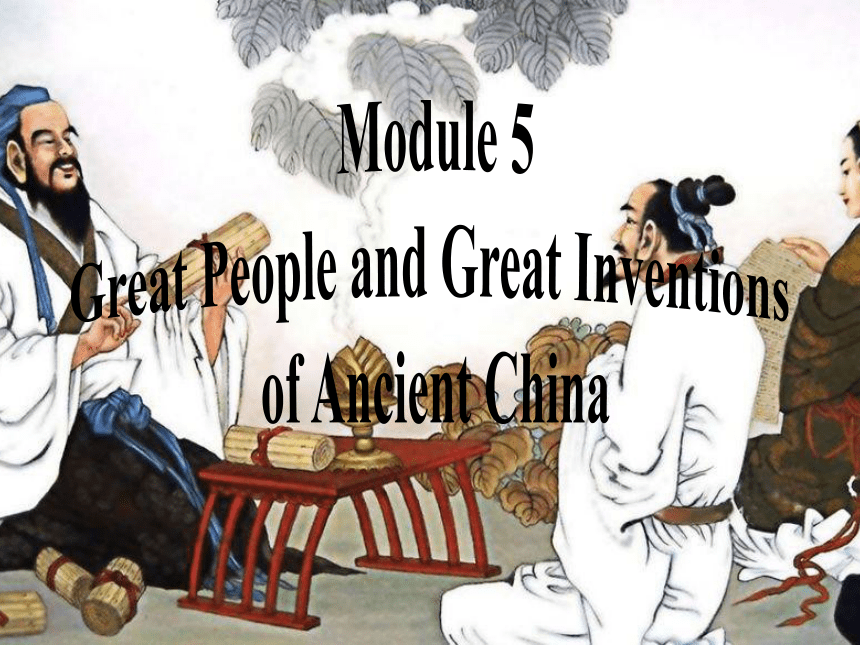

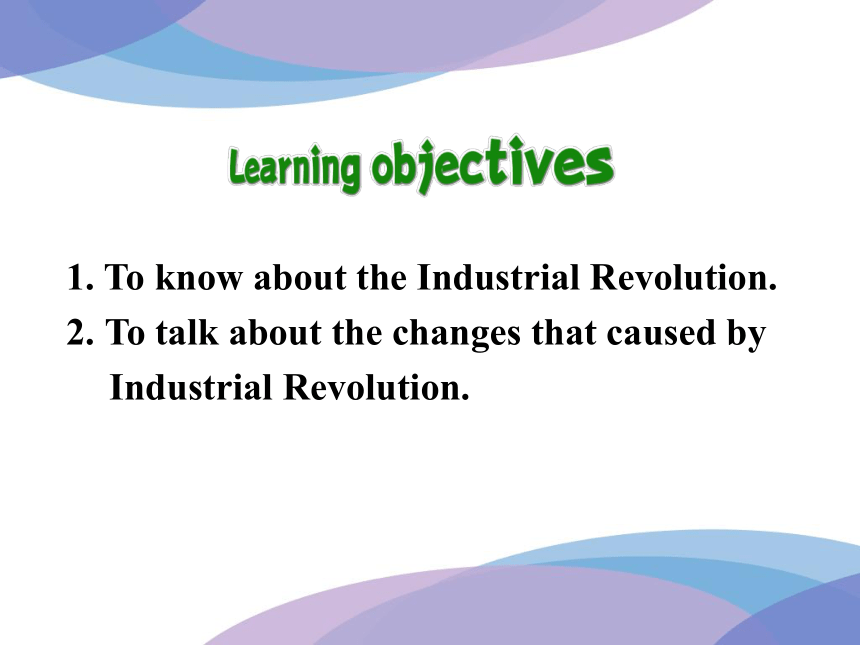
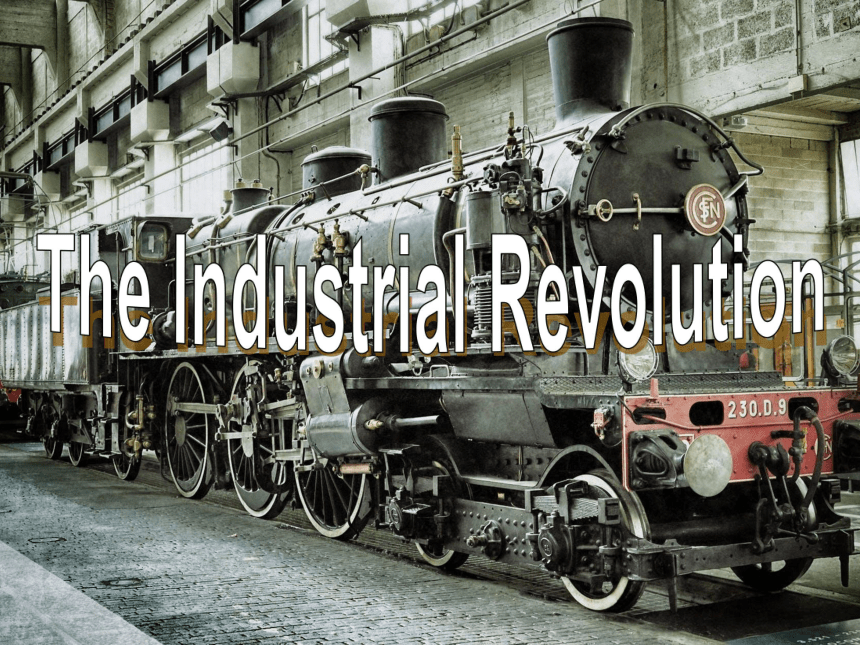
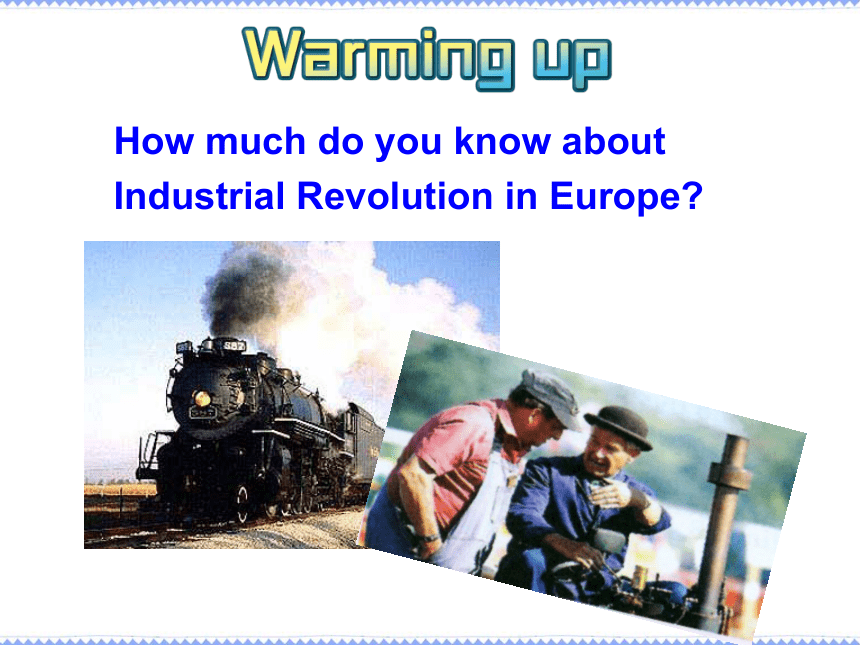
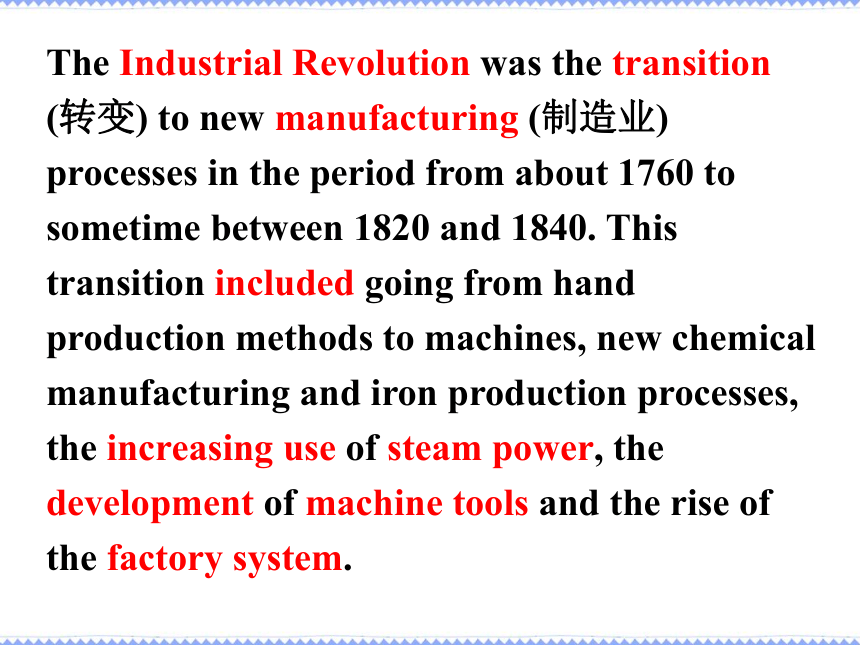
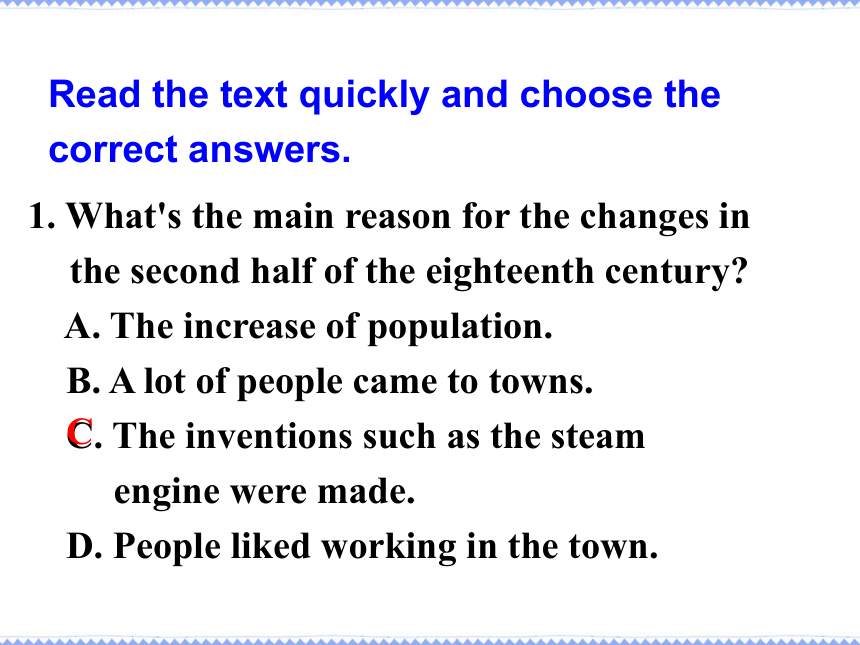
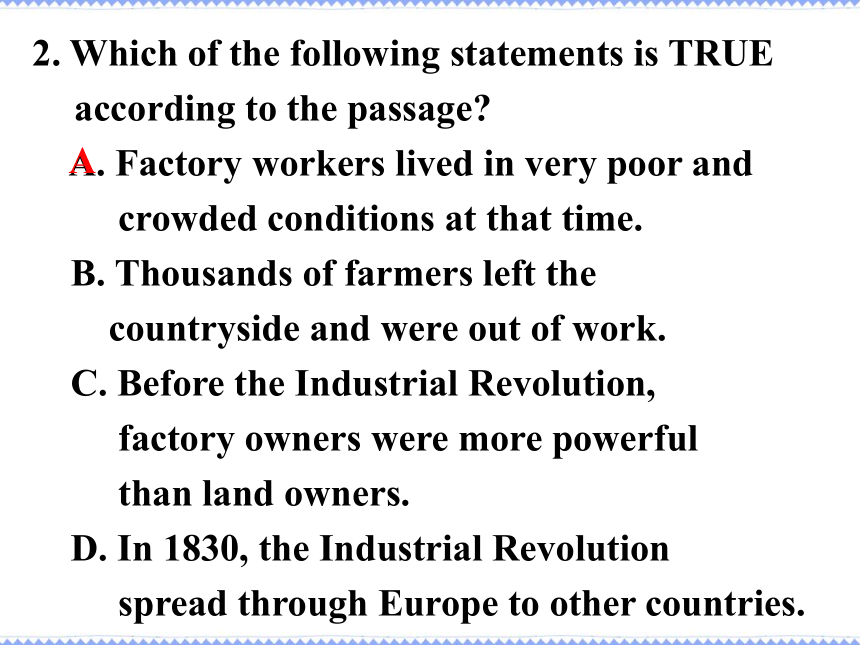
文档简介
(共26张PPT)
Module 5
Module 5
Great People and Great Inventions
of Ancient China
1. To know about the Industrial Revolution.
2. To talk about the changes that caused by Industrial Revolution.
The Industrial Revolution
How much do you know about Industrial Revolution in Europe
The Industrial Revolution was the transition (转变) to new manufacturing (制造业) processes in the period from about 1760 to sometime between 1820 and 1840. This transition included going from hand production methods to machines, new chemical manufacturing and iron production processes, the increasing use of steam power, the development of machine tools and the rise of the factory system.
1. What's the main reason for the changes in the second half of the eighteenth century
A. The increase of population.
B. A lot of people came to towns.
C. The inventions such as the steam
engine were made.
D. People liked working in the town.
C
Read the text quickly and choose the correct answers.
2. Which of the following statements is TRUE according to the passage
A. Factory workers lived in very poor and
crowded conditions at that time.
B. Thousands of farmers left the
countryside and were out of work.
C. Before the Industrial Revolution,
factory owners were more powerful
than land owners.
D. In 1830, the Industrial Revolution
spread through Europe to other countries.
A
3. The steam engine was first used in _____.
A. factories B. farms
C. schools D. mines
4. ______ made the population of towns and cities greatly increased.
A. The invention of the steam engine
B. That many factories were built in towns
C. That farmers liked working in the town
D. The Industrial Revolution spreading to
other countries
D
B
1. What changes happened with the Industrial Revolution
Farming life became industrial; mass production was possible; people moved to the cities; the steam engine were invented.
Open.
2. What do you know about the
development of industry in China
Listen and read the text carefully and answer the questions.
1. The Industrial Revolution began in the 1960s. ( )
2. With the Industrial Revolution, factories appeared and mass production became possible for the first time. ( )
3. Inventions such as the steam engine made the Industrial Revolution possible. ( )
4. During the Industrial Revolution, land owners had more power than factory owners. ( )
F
T
T
F
Ture or False.
Complete the table.
Places Time Symbol
First in Europe and the US and then other countries such as Japan In the second half of the 18th century In 1769 James Watt
invented ______________________.
the steam engine
Changes Results
Factories appeared and _______________ became possible for the first time. The population of towns and cities greatly increased. Factory owners became more powerful than ______________.
Thousands of people left the countryside to work in the city.
Factory workers lived in poor and ________ conditions.
mass production
land owners
crowded
In Europe, in the second half of the eighteenth century, there was a important change in society, it was called the “Industrial Revolution”. As the Industrial Revolution, factories appeared and mass production became possible the first time. The factories were built in towns and as a result, the population of towns and cities was greatly increased.
根据课文,改正下面短文中的十处错误。
an
which
With
for
During the Industrial Revolution, factory owners became much powerful than land owners. Thousands of people leave the countryside to work in the city. Often, factory workers lived in poorly and crowded condition. From 1830 to the early 20th century, the Industrial Revolution spread through Europe and the US and then in other countries such as Japan.
more
left
poor
conditions
to
1. Cars were first used at the end of the
nineteenth century, and were no faster than a horse.
no + 比较级 +than 前者跟后者一样不
【拓展】
no more than 仅仅;只不过
more …than… 与其说……倒不如说……
no more than 不超过;至多
more than 多于,超过;不仅仅;非常,超出
【语境应用】 完成句子。
1) Our house is ________________ (和……一样小) yours.
2) The problem is _________________________ (和……一样不重要) that one.
no bigger than
no more important than
2. In conclusion, I think that cars are very useful because travel is so easy with a car.
in conclusion 总之;最后;最终
【拓展】
reach/draw/come to/arrive at a conclusion
得出结论;告一段落
at the conclusion of 当……完结时
bring sth. to a conclusion
使结束; 谈定(买卖等)
come to the conclusion that...
所得的结论是……; 断定
【语境应用】补全下面句子。
1) We should never __________________ (匆忙地下结论).
2) _____________ (最后), I'd like to thank everyone who helped to make this event possible.
jump to conclusions
In conclusion
3. Often, factory workers lived in poor and crowded conditions.
condition n. 状况;(居住、工作或做事情的) 环境,条件(常用作复数);条件
【归纳】
in good/poor/excellent condition处于……状态
under ... conditions 在……的条件下
on condition that ...
倘若;如果;在……条件下
on no condition 决不;一点也不
out of condition 身体不适
【语境应用】根据汉语意思补全下面句子。
1) 如果你能保持房间干净整洁,我们就会让你使
用。
We’ll let you use the room _______________
you keep it clean and tidy.
2) 办公室的环境让我们觉得舒服。
____________________ made us comfortable.
3) 她不能在那种状态下旅行。
She can't travel ________________.
4) 他身体不适已经有几个星期了。
He ______________________ for several weeks.
on condition that
Conditions in the office
in that condition
has been out of condition
19世纪后期
重要的社会变革
工业革命
直到那时
由于, 因为
in the late 19th century
important changes in society
the Industrial Revolution
until then
because of
例如, 诸如
起初, 开始
成千上万的
第一次
最后
such as
at first
thousands of
for the first time
in conclusion
What do you know about the development of industry in China Write a passage in 80 words.
Module 5
Module 5
Great People and Great Inventions
of Ancient China
1. To know about the Industrial Revolution.
2. To talk about the changes that caused by Industrial Revolution.
The Industrial Revolution
How much do you know about Industrial Revolution in Europe
The Industrial Revolution was the transition (转变) to new manufacturing (制造业) processes in the period from about 1760 to sometime between 1820 and 1840. This transition included going from hand production methods to machines, new chemical manufacturing and iron production processes, the increasing use of steam power, the development of machine tools and the rise of the factory system.
1. What's the main reason for the changes in the second half of the eighteenth century
A. The increase of population.
B. A lot of people came to towns.
C. The inventions such as the steam
engine were made.
D. People liked working in the town.
C
Read the text quickly and choose the correct answers.
2. Which of the following statements is TRUE according to the passage
A. Factory workers lived in very poor and
crowded conditions at that time.
B. Thousands of farmers left the
countryside and were out of work.
C. Before the Industrial Revolution,
factory owners were more powerful
than land owners.
D. In 1830, the Industrial Revolution
spread through Europe to other countries.
A
3. The steam engine was first used in _____.
A. factories B. farms
C. schools D. mines
4. ______ made the population of towns and cities greatly increased.
A. The invention of the steam engine
B. That many factories were built in towns
C. That farmers liked working in the town
D. The Industrial Revolution spreading to
other countries
D
B
1. What changes happened with the Industrial Revolution
Farming life became industrial; mass production was possible; people moved to the cities; the steam engine were invented.
Open.
2. What do you know about the
development of industry in China
Listen and read the text carefully and answer the questions.
1. The Industrial Revolution began in the 1960s. ( )
2. With the Industrial Revolution, factories appeared and mass production became possible for the first time. ( )
3. Inventions such as the steam engine made the Industrial Revolution possible. ( )
4. During the Industrial Revolution, land owners had more power than factory owners. ( )
F
T
T
F
Ture or False.
Complete the table.
Places Time Symbol
First in Europe and the US and then other countries such as Japan In the second half of the 18th century In 1769 James Watt
invented ______________________.
the steam engine
Changes Results
Factories appeared and _______________ became possible for the first time. The population of towns and cities greatly increased. Factory owners became more powerful than ______________.
Thousands of people left the countryside to work in the city.
Factory workers lived in poor and ________ conditions.
mass production
land owners
crowded
In Europe, in the second half of the eighteenth century, there was a important change in society, it was called the “Industrial Revolution”. As the Industrial Revolution, factories appeared and mass production became possible the first time. The factories were built in towns and as a result, the population of towns and cities was greatly increased.
根据课文,改正下面短文中的十处错误。
an
which
With
for
During the Industrial Revolution, factory owners became much powerful than land owners. Thousands of people leave the countryside to work in the city. Often, factory workers lived in poorly and crowded condition. From 1830 to the early 20th century, the Industrial Revolution spread through Europe and the US and then in other countries such as Japan.
more
left
poor
conditions
to
1. Cars were first used at the end of the
nineteenth century, and were no faster than a horse.
no + 比较级 +than 前者跟后者一样不
【拓展】
no more than 仅仅;只不过
more …than… 与其说……倒不如说……
no more than 不超过;至多
more than 多于,超过;不仅仅;非常,超出
【语境应用】 完成句子。
1) Our house is ________________ (和……一样小) yours.
2) The problem is _________________________ (和……一样不重要) that one.
no bigger than
no more important than
2. In conclusion, I think that cars are very useful because travel is so easy with a car.
in conclusion 总之;最后;最终
【拓展】
reach/draw/come to/arrive at a conclusion
得出结论;告一段落
at the conclusion of 当……完结时
bring sth. to a conclusion
使结束; 谈定(买卖等)
come to the conclusion that...
所得的结论是……; 断定
【语境应用】补全下面句子。
1) We should never __________________ (匆忙地下结论).
2) _____________ (最后), I'd like to thank everyone who helped to make this event possible.
jump to conclusions
In conclusion
3. Often, factory workers lived in poor and crowded conditions.
condition n. 状况;(居住、工作或做事情的) 环境,条件(常用作复数);条件
【归纳】
in good/poor/excellent condition处于……状态
under ... conditions 在……的条件下
on condition that ...
倘若;如果;在……条件下
on no condition 决不;一点也不
out of condition 身体不适
【语境应用】根据汉语意思补全下面句子。
1) 如果你能保持房间干净整洁,我们就会让你使
用。
We’ll let you use the room _______________
you keep it clean and tidy.
2) 办公室的环境让我们觉得舒服。
____________________ made us comfortable.
3) 她不能在那种状态下旅行。
She can't travel ________________.
4) 他身体不适已经有几个星期了。
He ______________________ for several weeks.
on condition that
Conditions in the office
in that condition
has been out of condition
19世纪后期
重要的社会变革
工业革命
直到那时
由于, 因为
in the late 19th century
important changes in society
the Industrial Revolution
until then
because of
例如, 诸如
起初, 开始
成千上万的
第一次
最后
such as
at first
thousands of
for the first time
in conclusion
What do you know about the development of industry in China Write a passage in 80 words.
